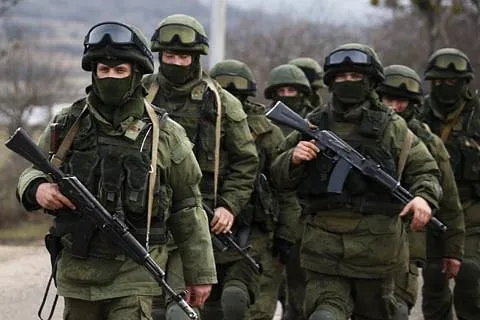In the early morning of February 24 Russian President Vladimir Putin ordered a “special military operation”—a euphemism for war– against Ukraine.
Earlier, on February 21, he had recognised the Donetsk Peoples Republic and the Luhansk Peoples Republic as independent states though they are separatist entities and part of Ukraine. Putin’s decision had deepened the Russia-Ukraine crisis and worsened NATO’s relations with Russia.
US, Britain and the EU had imposed sanctions against Russia after its February 21 move and indicated that if Putin made further ingress into Ukraine tougher sanctions will follow.
The US also cancelled Secretary of State Anthony Blinken’s meeting with his Russian counterpart Sergey Lavrov. The chances of a summit conference of President Joe Biden with Putin also evaporated. With the war, Putin’s relations with the Western world have ruptured.
In a speech on February 24 Putin claimed that the objective of the Russian operation was “to protect people who have been abused by the genocide of the Kyiv regime for eight years” and to “strive for the demilitarisation and denazification of Ukraine” and bring to justice those who committed the numerous bloody crimes against civilians, including citizens of the Russian Federation”.
The nature of the war Putin is waging has lead to the valid suspicion that Putin wants regime change in Ukraine and put in place a friendly government.
Soon after accepting Donetsk and Luhansk’s as independent states, the Russian President gave an insight into his thinking on Ukraine and its relations with Russia as well as his apprehensions about the West’s approach towards his country.
Putin’s speech which pursues the approach he had adopted in an article he wrote on Russia-Ukraine relations last year, shows that leaders are motivated by emotion too. They are not all cold logic and reason. Indeed, it is the infusion of sentiments that often add layers of complexity making difficult issues all the more difficult to resolve.
Many persons often imagine their leaders to be thoughtful, forward looking, careful and wise but sometimes their words and actions reveal that they are all made of the same flesh and blood as ordinary mortals.
In the article “On Historical Unity between Russians and Ukrainians” Putin wrote “Russians, Ukrainians, and Belarusians are all descendants of ancient Rus, which was the largest state in Europe”. He went on to note that they were “bound together” by one language, economic ties, the rule of the Rurik princes and Orthodox Christianity.
It is one matter to recall ancient ties quite another and dangerous to overlook the evolution of centuries as has obviously happened in sections of Ukraine which led to the development of a separate identity. In his February 24 speech Putin virtually denied that Ukraine had full statehood.
He went so far as to blame Lenin and the Soviets to creating the Soviet system based on giving a fillip to nationalities and through that laying the foundation of separatism and the present troubles.
If such thinking becomes the foundation of actions of powers, great and small, the entire edifice of the present global states system will get jeopardised. Current realities of the global states system have to be accepted. In a wise intervention in the UN Security Council debate on February 21 the Kenyan Permanent Representative said that boundaries in Africa was drawn by the colonial powers and had overlooked ethnic relationships.
That could have a cause of instability but after their African countries had accepted them to ensure peace. That is why respect for the territorial integrity of all states is of great importance. Hence, Putin’s action against Ukraine is obviously violative of a fundamental tenet of global order. That noted it is of paramount importance for great powers to reconcile their security interests for the sake of international peace and security.
In my last column I had pointed to the inherent contradiction between the principle of equality of all states and the interests of the great powers. This contradiction offends modern sensibility and is not found acceptable by those who are committed to the idea of a democratic international order.
Unfortunately, the world is governed not by idealism but proceeds on the basis of interests.
In its pursuit great powers do what the need to and tragically the vulnerable have to suffer what they must. This ought not to so but the world is a cruel place and the game of nations is a most cruel game. That is what is being seen in operation in Ukraine currently.
What is of course needed is to reconcile reasonable interests of the great powers. Naturally this is basically different from appeasing or pandering to a lust for territory.
Naturally also the reconciliation of interests is never an easy process. It is long and arduous and requires flexibility and an understanding of core interests. However, the alternative to this process is military action of one kind or another which leads to popular suffering.
With Putin’s war on Ukraine NATO countries and their allies are seeking to isolate Russia and impose effective sanctions. Biden and the EU have announced these against Russia’s major banks.
The sanctions will freeze their assets and prevent them from dealing in European currencies. Assets in the West of leading Russian industrialists are being frozen.
Sanctions on the flow of Russia’s energy have not been imposed to spare more pain on US and EU consumers already suffering from higher energy costs.
Biden hopes that these steps will chasten Putin. They are unlikely to do so in the near future. This crisis will continue because all involved countries are pursuing maximalist positions till now.
Disclaimer: The views and opinions expressed in this article are the personal opinions of the author.
The facts, analysis, assumptions and perspective appearing in the article do not reflect the views of GK.







